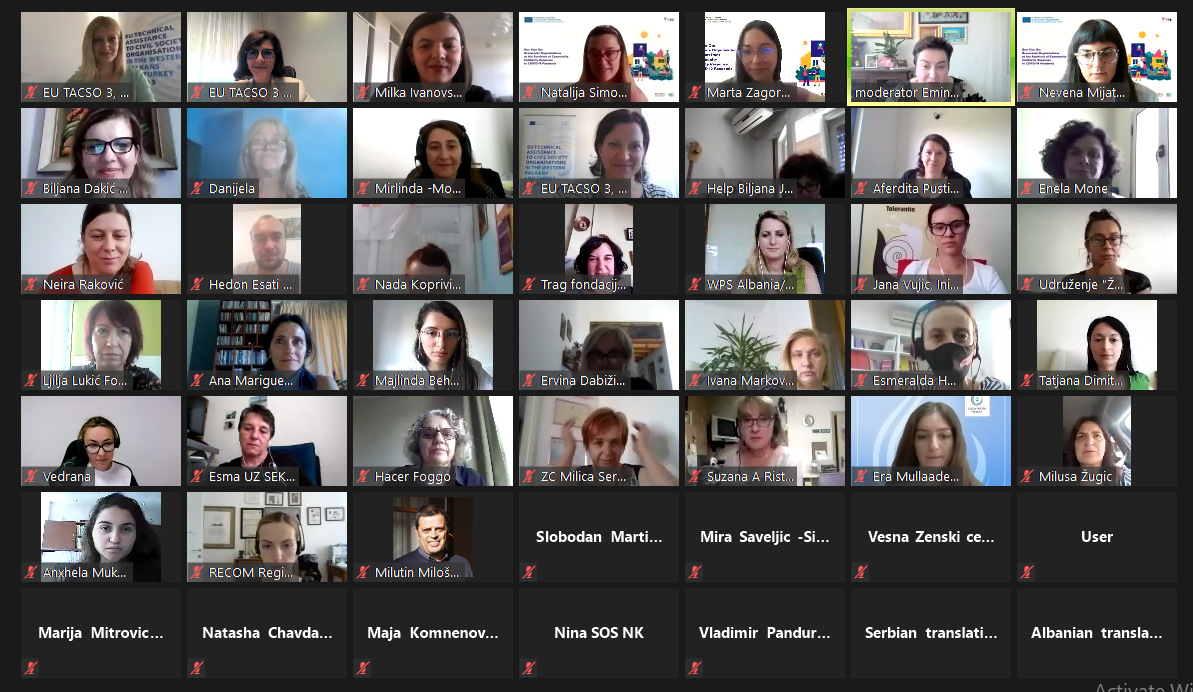
On 9 and 10 June 2021, EU TACSO 3 and Trag Foundation from Serbia organised a People-to-People (P2P) event under title ”One Year Later – Grassroot Organisations Taking the Lead in Solidarity Response to the COVID-19 pandemic“. The event was a follow-up on the Regional Meet-up event “Emergency Response to COVID-19: Practices, Lessons and Needs of Civil Society” organised by EU TACSO 3 in June 2020, in order to complement the emergency response discussion with the context of the consequences for civil society and society in general, and ways to deal with post-crisis patterns in the future.
This two-day on-line event provided an opportunity for more than 70 representatives mainly from local grass-root organisations from the Western Balkans and Turkey (WBT) to learn from their peers on main challenges faced during the COVID-19 and other complex crisis and jointly explore the solutions that local communities employed to deal with challenges, practical developments, and civil society responses to them.
Milka Ivanovska Hadzievska, Postdoctoral Fellow at Lund University presented findings of the situation of CSOs globally and in the UK particularly during the crisis of COVID-19 pandemic. She said that the crisis during 2020-2021 has reinforced a trend of shrinking space: “CSOs across contexts faced increased demand for services but were also affected by significant funding cuts. Local level CSOs have proven to be vital in relation to the crisis response, as various networks and volunteer organisations mobilised to assist where needed. CSOs in the UK faced a combination of challenges: funding that came from fundraising events and charities diminished during the crisis as this source of revenue was cut. Private donations were also pulled out and in total in the first 12 weeks, it is estimated there were 4.3 billion British Pounds of lost income. The pandemic strengthened cross-sectoral collaboration”. In conclusion, she noted that the pandemic emphasised legal, funding and logistical constraints on the work of CSOs. Smaller CSOs were affected and faced closure. The effective response of grassroots CSOs to local community needs during the pandemic clearly demonstrated the limits of centralisation of power, opening calls for decentralisation of decision-making.
During the conference, the Trag Foundation’s report “Solidarity Response to COVID-19: Results Achieved in Communities through the Emergency Support Program” was presented by Nevena Mijatović, Trag Monitoring and Evaluation Coordinator. The presentation tackled the capability of supported CSOs to deal with the crisis and covered the activities implemented by 63 financially supported CSOs from March to September 2020. The highlighted activities included using of role models to encourage vaccinations, using traditional media to tackle domestic violence, food distribution, community mobilisation, etc. In conclusion, it was noted that the type of activity is not the key but rather the approach to the community, beneficiaries and acceptance of responsibility that comes with leadership.
During the discussion sessions, CSOs from Albania, Bosnia and Herzegovina, Kosovo*,[1]Montenegro, North Macedonia, Serbia and Turkey shared experience and discussed issues on three overarching themes: CSOs as essential social service providers during COVID-19; Activating community solidarity: grassroots organisations mobilising community resources for immediate relief during the COVID-19 crisis; Is the future of activism on-line? Discussion of on-line community organising challenges and opportunities.
The most important component for successful action in communities during a pandemic is consistency in adhering to anti-pandemic measures was one of the key points taken from this exchange event.
It was discussed that the crisis caused by the COVID-19 pandemic brought various legal, administrative and logistical obstacles to the work of civil society but has also shown its strength. The effective response of CSOs to the consequences of the pandemic showed the limitations of the centralized system of government, and organisations present at the event urged for decentralization of decision-making, recognition of civil society role and capacity in coping with the crisis to achieve a greater degree of community resilience.
The event was concluded by noting that the pandemic, without a doubt, brought constraints to CSOs in general. CSOs that were smaller ceased to exist due to financial challenges. The effective response of grassroots clearly demonstrated the readiness to respond to the crisis. In several cases, governments were not fully responsive, and this is an opportunity for CSOs to gain a competitive advantage to claim their position and importance also after the crisis. For organisations that already had the trust of their community, worked in sync with the needs of the beneficiaries, and in this regard, many thing were achieved. The rest gained the trust of the community by being responsive. CSOs were fast to adapt and were open and demonstrated high levels of solidarity. At the end of the event, it was highlighted that most of the efforts to support people and communities in need, were made locally and this event was a great opportunity to share and compare the solutions employed by CSOs in tackling those.
* This designation is without prejudice to positions on status, and is in line with UNSCR 1244/1999 and the ICJ opinion on the Kosovo declaration of independence.
